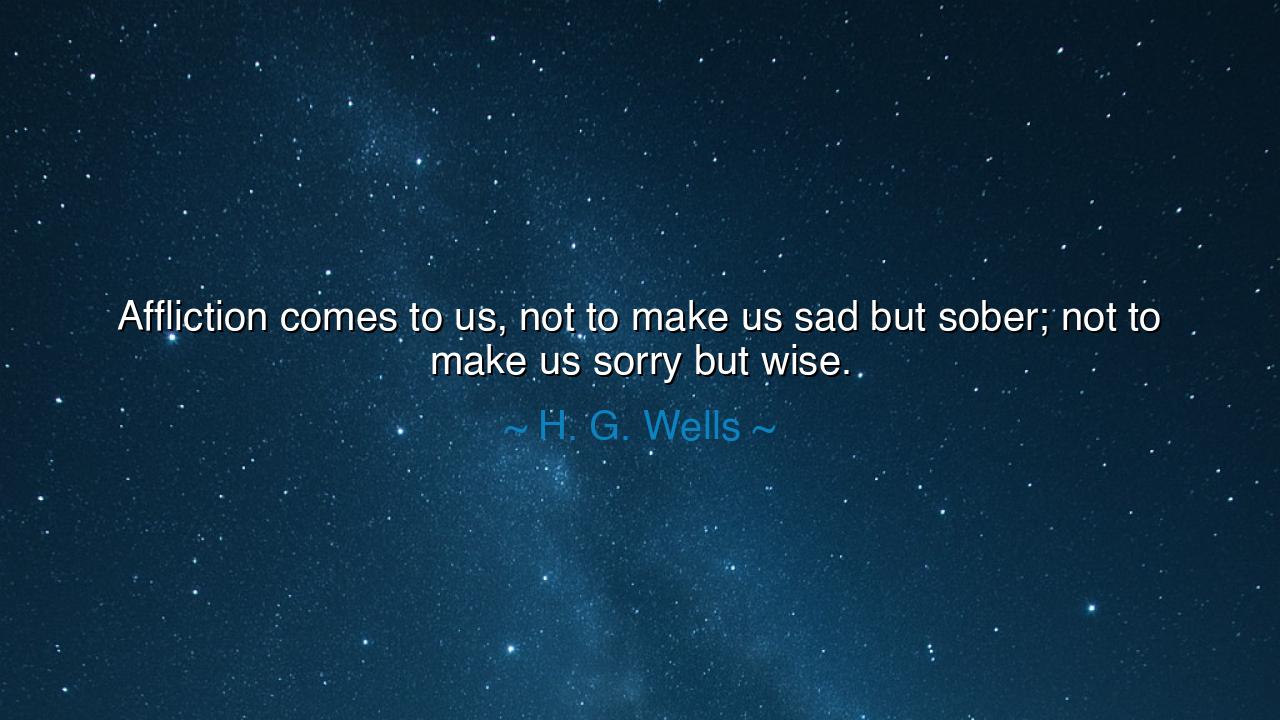
Affliction comes to us, not to make us sad but sober; not to make






The philosopher and visionary H. G. Wells, best known for peering into both the future of mankind and the depths of its soul, once wrote: “Affliction comes to us, not to make us sad but sober; not to make us sorry but wise.” In this brief and luminous phrase, he revealed a truth as ancient as humanity itself—that suffering is not the enemy of life, but its sternest and most faithful teacher. It comes not as punishment, but as refinement; not to break the spirit, but to temper it into strength. Wells reminds us that when affliction enters our lives, we are being invited to awaken—to see the world and ourselves more clearly than comfort ever allows.
The origin of this quote arises from Wells’s reflections on the human condition—his recognition that progress, both personal and collective, is born not in ease but in trial. Though known as a writer of science and imagination, Wells was also a moral thinker, one who understood that knowledge and growth must be purchased with struggle. His words echo the wisdom of the ancients, who saw hardship not as misfortune but as initiation. To be sober, in his meaning, is not to be joyless, but to be awake—to see beyond illusion, to face reality with courage, and to act with wisdom rather than impulse.
Throughout the ages, the great souls of history have discovered this truth in their own afflictions. Consider Nelson Mandela, who spent twenty-seven years in prison, stripped of freedom, separated from his family, and yet emerged not bitter, but radiant with grace. His captivity could have destroyed him, but instead it refined him; it turned anger into clarity, sorrow into discipline, and vengeance into vision. When he walked out of Robben Island, he was no longer merely a man—he was a lesson. In him we see the essence of Wells’s teaching: affliction makes us wise when we allow it to purify rather than poison us.
Likewise, the Stoics of ancient Rome, such as Seneca and Marcus Aurelius, spoke often of this same transformation. “Fire tests gold,” they said, “and adversity tests the brave.” They knew that sorrow, when met with reflection, becomes a forge for the soul. The one who suffers without understanding grows bitter, but the one who suffers with awareness grows luminous. Wells, in his modern age, was restating the timeless law: that grief and wisdom are twin companions. Those who avoid all pain remain shallow; those who face it with courage become deep as rivers and clear as glass.
To “make us sober,” affliction teaches humility—it reminds us of our limits, it tears down the idols of pride. To “make us wise,” it reveals what truly matters. The one who has suffered learns to cherish peace, to value love, and to see beauty even in the smallest of things. Thus, affliction is not a curse to flee from, but a sacred mirror, showing us what remains in us when all else is taken away. As the Persian poet Rumi once wrote, “The wound is the place where the light enters you.” So too, Wells’s words remind us that every hardship conceals within it a seed of illumination.
The lesson of this teaching is clear: when sorrow comes, do not drown in it—listen to it. Ask what it seeks to reveal. Do not curse the storm; learn from its wind. When affliction visits, let it strip away what is false, until only the truth remains. For the sorrow that refines is a blessing disguised as pain, and those who learn from it rise stronger than before.
So, my child, when hardship enters your path, remember the wisdom of H. G. Wells: “Affliction comes to us, not to make us sad but sober; not to make us sorry but wise.” Let suffering not make you despair, but aware; let it not close your heart, but cleanse it. Life is not measured by how we avoid pain, but by how we transform it. When affliction comes, meet it as a teacher, not an enemy. For those who have suffered and understood are the ones who truly live—they walk the earth not broken, but enlightened, carrying in their hearts the quiet fire of wisdom that sorrow alone can give.






AAdministratorAdministrator
Welcome, honored guests. Please leave a comment, we will respond soon